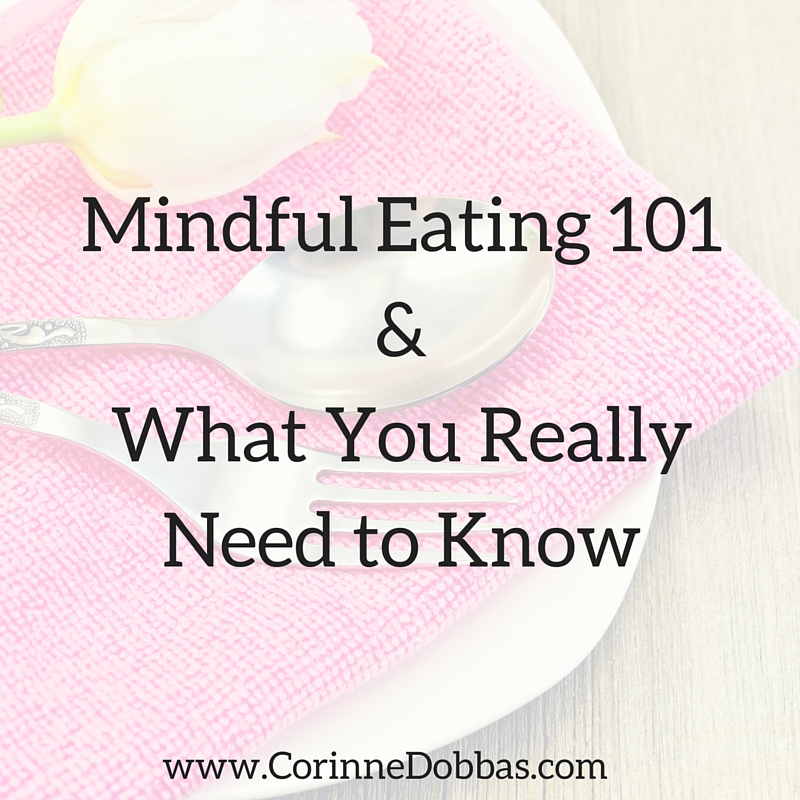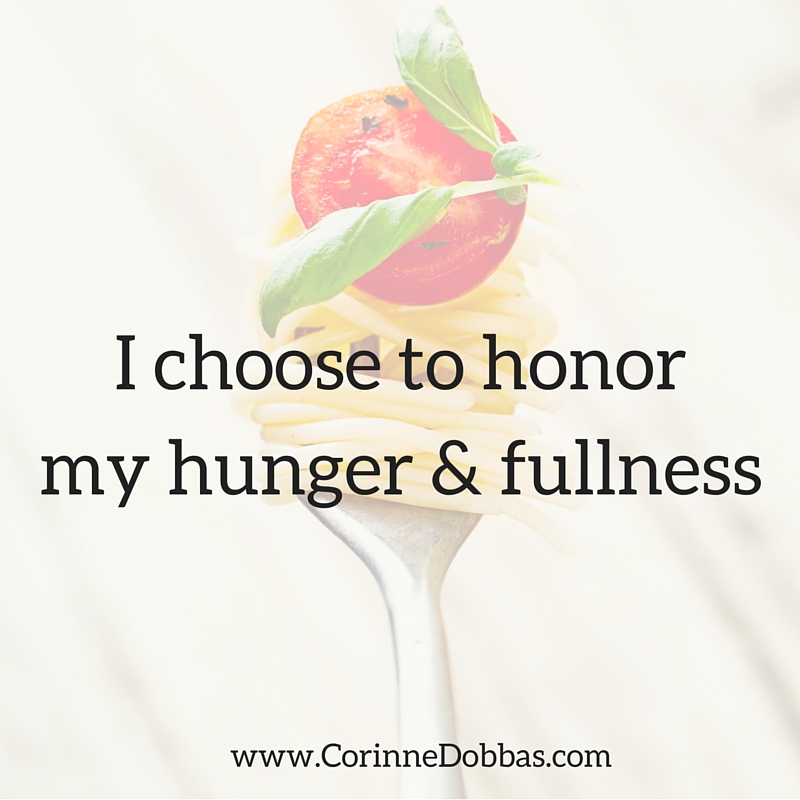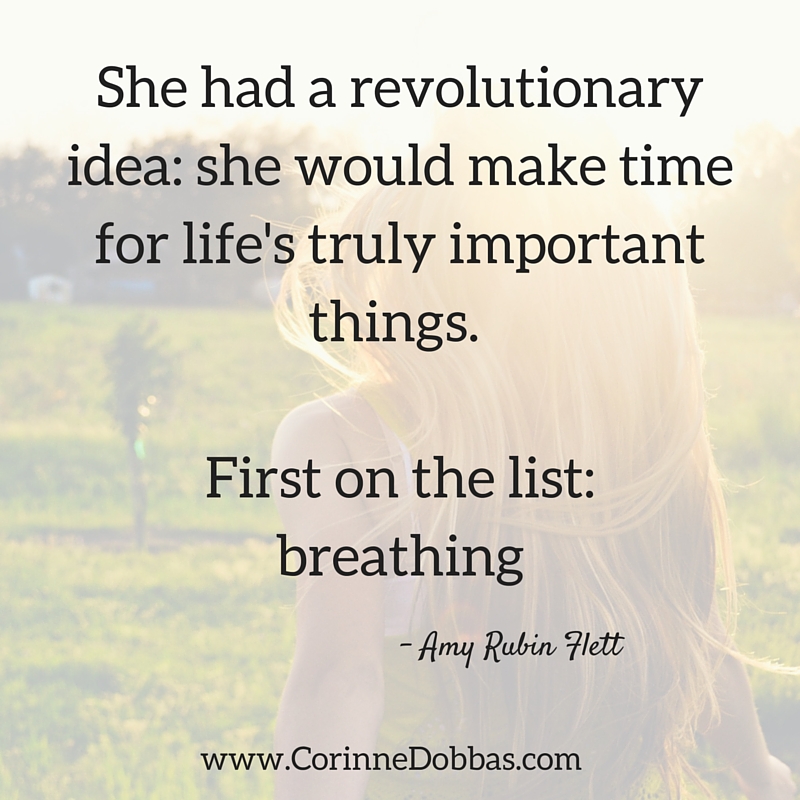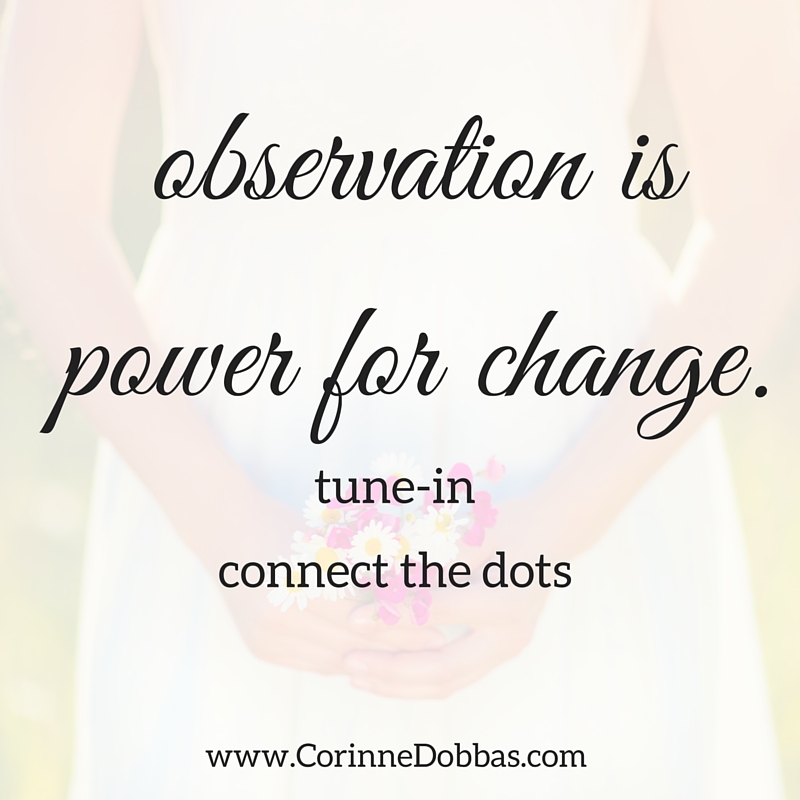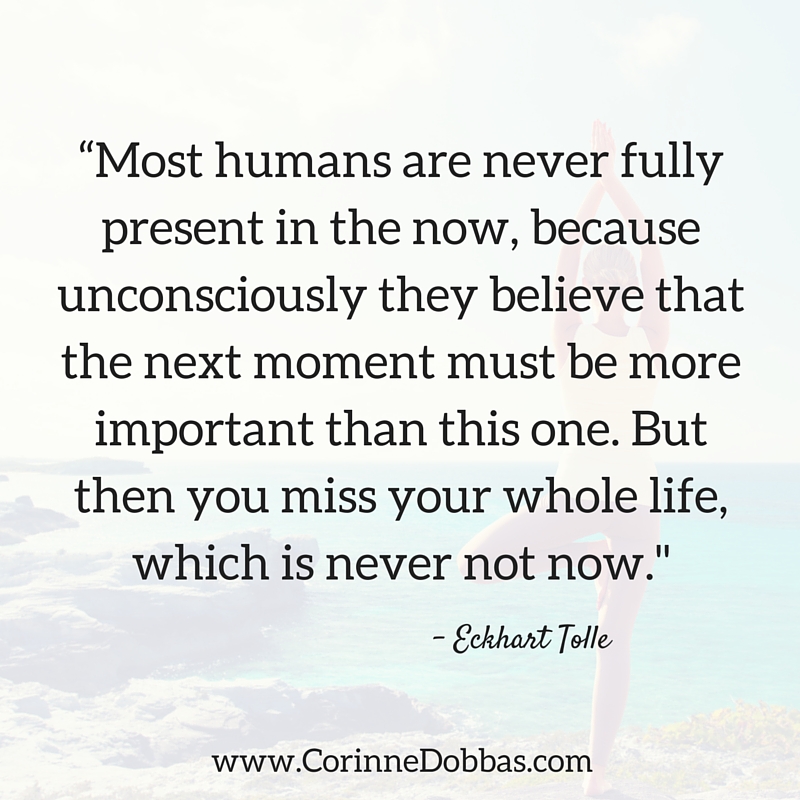Mindful Eating 101 & What You Really Need to Know
Years ago, I remember – vaguely – someone explaining mindful eating to me.
Mindful eating, I was told, was where you’re fully present in your eating experience. You’re aware of your hunger level, fullness factor, your food’s taste and texture, it’s aroma, etc.
There are no “off-limit” foods. No counting calories. And for sure no formal meal plans.
I – being someone who grew up watching (and hearing) their mother relentlessly count calories to remain at a healthy weight … and being someone who followed suit – was petrified of eating this way.
Trust your body? No counting calories? Be healthy?!
You might as well have been speaking French …
I didn’t speak French.
Still don’t…
Today, however, mindful and intuitive eating (which I need to do another post on) is what I live by.
Honestly, I shudder when I think back at how I used to be with food. There was no enjoyment. Just the constant game of “how close can I eat to 1200 calories today?”
Mindful eating has changed my life, and it can change yours too, if you’re open + willing.
You simply need to understand the basics and what most experts get totally wrong about it – probably making you super frustrated.
The intention of this post is to help you get on the mindful eating train, even if you’ve tried and fallen off before. Or, at least open your mind to it. And stay with me until the end – because there’s a pretty awesome surprise that’ll help guide you.
What is mindful eating?
According to The Center for Mindful Eating:
Mindful Eating is allowing yourself to become aware of the positive and nurturing opportunities that are available through food selection and preparation by respecting your own inner wisdom. By using all your senses in choosing to eat food that is both satisfying to you and nourishing to your body, acknowledging your responses to food (likes, dislikes or neutral) without judgment, and becoming aware of physical hunger and satiety cues to guide your decisions to begin and end eating you can change your relationship to food.
As you see, with mindful eating, there’s a deep understanding that food is both nourishing to the body and for the soul aka fear and food don’t exist in the same sentence, as they do in many diets.
Here, your goal is simply to show up fully for your meal, pay attention, and listen to your body. Be mindful. So that you can learn to observe (instead of judge) yourself during and after your eating experience. What you liked about it, what you didn’t like about it. For example, did you go too long without eating anything and then overeat? Did you eat past the point of fullness?
A judging response is something like:
I suck. I can’t do this. I always eat until I’m too full. I can’t even get this right!
An observational response is something like:
OK, so I’m way too full right now and uncomfortable. I brought my work baggage to my meal and skipped a proper lunch today. It’s time for me to seriously start planning ahead and having lunch and not going the whole afternoon without food, setting myself up for a binge! And I’m going to practice not letting others’ stuff stay with me. I’m going to imagine it sliding off of me, so I can move forward and not emotionally eat so much.
Do you see the (huge) difference?
One responses keeps you stuck in the story of “I can’t.” And the other allows you to connect the dots from your observations so you can start making serious lasting change.
Also note that with mindful eating, you’re present. Which means no eating while watching TV, driving or scrolling through your Insta feed. In other words, you’re mindful. Why the name makes so much gosh-darn sense (wink, wink).
And when you’re mindful, you tune-in to not only your emotions, but your food – it’s taste, texture, aroma, and color. AND what’s so different from the dieting world, is if you don’t eat mindfully, who cares?! There are no “rights” or “wrongs” here. No “good” or “bad” foods. This is about learning how to listen to your own body and break free from the diet mentality that has you thinking your weight equates your worth or that weight loss is the goal… It is not. Rather, the goal is body trust, food freedom, and reconnecting with yourself.
Lastly, and quite possibly most importantly, you’re allowing your hunger and fullness cues to guide you. Like a child, you eat when you’re hungry and you stop when you’re full. We’ll get to how you start this below.
I don’t have any hunger cues – how can I mindfully eat? Aka what most experts get wrong about it.
This is where most experts go wrong and where you may get frustrated. If you have no hunger cues – whether that be from years of dieting or consistently ignoring you hunger, quite simply, you won’t be able to honor your hunger cues because they’re A) Not going to really be there; or B) They’ll be there, but late at night after going without food most of the day, or only in the late afternoon because your hunger hormones and system are out of sync.
So, you can’t just go tell someone to eat mindfully when the cues to help them do so simply aren’t there.
That being said, what do you?
If you have no hunger cues or you’re currently ingrained in the pattern of backloading your day (eating mostly at night), the most important thing is to get your body on a consistent schedule. A pattern. Our bodies love patterns.
In short, what this looks like is within 60-90-minutes of waking (or earlier!), get in some nourishment. Break the fast. Then, every 3-4 hours after this point, eat something and keep checking-in with yourself every 3-4 hours throughout the day to get in some fuel.
For example, if you wake at 7 am, eat around 8 am. You then may want a snack around 10:30-11 am or maybe you can wait until lunch, around noon (see how you feel- you are your own best teacher). Come 3 or 4 pm, you have a snack. Then 6 or 7 pm dinner. And dessert, if you fancy! If you’re staying up until midnight and you ate dinner at 6 pm, you’ll need more food too, like some natural nut butter on an apple to keep you satisfied and feeling good. How do you decide this? You practice, take your time, and check-in with your body.
The main point here is that you’re consistently nourishing your body. You’re not eating like a sumo wrestler, where you go all day without food, stock-up, and sleep. And you’re learning how to listen and connect with your body.
So, if you don’t have any hunger cues, don’t panic. Just get your body in a rhythm and show up present to your eating occasion.
Again… If you’ve been a chronic dieter, a breakfast skipper, or have been suppressing (or avoiding) your hunger for some time, it is not uncommon to not have hunger cues. BUT you can move through this.
Simply try getting your body on the rhythm of eating within an hour of waking up and checking-in with your hunger every 3-4 hours after that. Eventually, you will begin understanding and feeling your body’s hunger and fullness cues, and eventually, you’ll begin to start asking yourself, “What would be satisfying to me right now?” And soon enough, you won’t be freaked out by cravings. If you want something – whether to just enjoy it or because you’re hungry – you will and that’ll be that. It’s a beautiful thing. But it’s also a practice, so give yourself time.
Also, please know that in the beginning, the practice of listening for your hunger and fullness signals may seem overwhelming, but that’s just because it’s the beginning and something new. With time and practice, it’ll become intuitive.
Tune-in to your foods’ textures, eat without distraction, take pauses and check-in on how full you are and honor when you are.
Within a few weeks or so (remember, every body is different) – you’ll start to get hunger cues – which is awesome. It means your body is communicating with your brain and your metabolism is being stoked.
In sum: no hunger cues? Get your body on a schedule so you have some structure (and don’t feel so lost). This will help you start listening to your body so you can start honoring your hunger, fullness, cravings and what sounds satisfying.
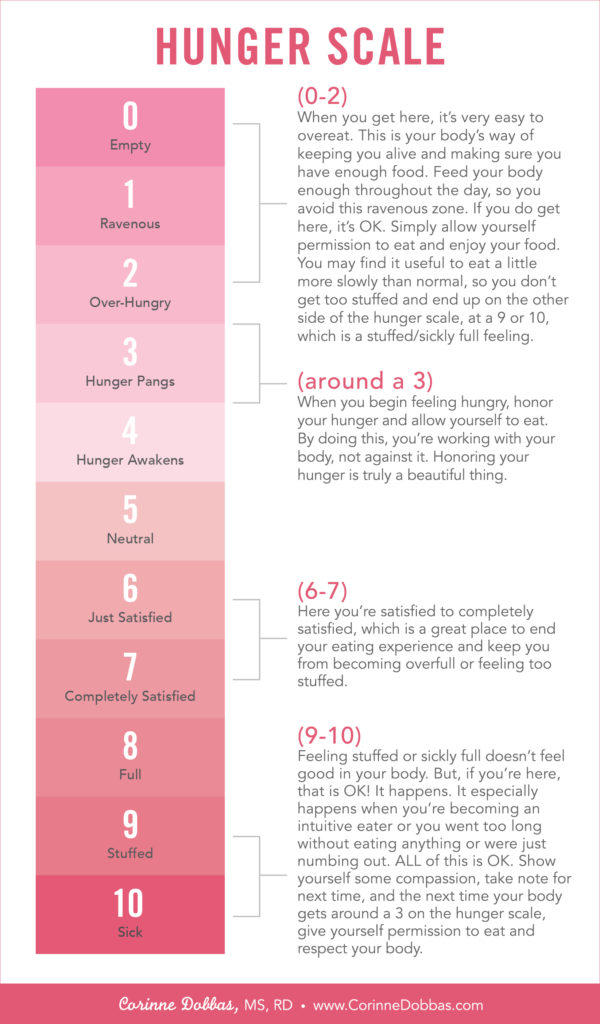
How can I practice mindful eating?
Start thinking of your hunger on a scale.
If we let ourselves get to a 0 – totally empty – it’s our body’s physiological reaction to freak out and want to eat and eat and eat because we have no more gas in our tank. We want to avoid this, as you’d imagine.
When our hunger starts to awaken and we feel physiological hunger (stomach rumbles, pains, and aches, feeling lightheaded or weak) we want to eat. This marks around a 3 on the hunger scale. Our hunger means our metabolism is working. It’s our body communicating with our brains, saying, “Hey, feed me!”
So know that this kind of hunger is a good thing. So often we’re feed a low-level message that hunger is bad. That we should try to avoid it, and eat as little as possible…. Total BS. You know where that gets you? …. Face first polishing off a bag of Doritos or Ben and Jerry’s. Appreciate your hunger. Honor it. And fuel your body. Yes, it can be that simple. It really can.
So before you eat, take 5 seconds to check-in with yourself and ask, “How hungry am I?” Then, rank it on the hunger scale. Get aware.
Throughout your meal, notice your fullness. You want to stop eating around a 6-7 – just satisfied to completely satisfied.
We want to avoid the 9-10 zone (so stuffed we feel sick) because it feels so gosh-darn uncomfortable. Plus, it can set you up in that vicious cycle of eating too much, feeling super guilty, eating very little, getting super hunger, getting too stuffed and repeat, repeat, repeat.
As you’re starting to see, the object of mindful eating is to keep your body balanced. To always be somewhere in the 3 (hunger pangs) to 7-ish (completely satisfied) zone. To avoid going too far on either end of the spectrums. Our bodies don’t like extremes.
Make sense?
Good.
Remember, eating this way is a practice. Look at it like an experiment. It’s a totally new of eating that will take a bit of time, but once you start and really tune-in and show up for every meal like this, you’ll catch on fast. And pretty soon, it’ll just become how you eat naturally, and I can tell you from personal experience that once it does, it’s amazing.
What happens if I have a hard time recognizing fullness?
One of the biggest reasons we have a hard time recognizing fullness is because we don’t allow ourselves the time to. We eat quickly, on-the-go, without our brains being able to recognize that yes, we are – in fact – full.
So give yourself time. Eat slower. Eat on a plate. Or, at least eat without any distractions. Make meal time something special. It can take up to 20 minutes, from the start of eating, for your brain to recognize that you’re full. Give yourself time.
Other things to look for, if you’re always feeling hungry:
:: Did your meal include a protein food? (i.e. chicken, fish, buffalo, yogurt, eggs, beans/lentils, steak, seafood, turkey, tempeh, tofu). Protein helps you feel fuller longer and fuels lean muscle mass.
:: Did you go too long without eating anything? More than 4-5 hours? Getting yourself in the 0-3 hunger scale zone? Or maybe you skipped a post-workout snack? If we go too long without eating, we’re setting ourselves up to overeat because we have a harder time feeling full because we’re sooooo hungry! Same thing goes for skipping post-workout nutrition.
:: Are you drinking enough water throughout the day? Our brains can mistake thirst for hunger. As a general rule of thumb, I suggest at least 2 liters of water per day.
:: Are you eating enough produce at your meals? A great way to fill up with filling fiber and nutrients that your body needs.
:: Are you totally skipping carbs (think brown rice, quinoa, sweet potatoes, bread, beans/lentils)? Because if so, that may be why you’re always feeling hungry. You see, carbs help make you feel full and satisfied. If you’re always hungry and avoiding them, try adding some back and see what happens. Experiment.
:: You’re depriving yourself of what you really want. We all know that we want what we can’t have. This isn’t about depriving yourself, it’s simply about honoring your hunger and fullness. If you really want something, enjoy it!
Will mindful eating help me lose weight?
Maybe. Maybe not.
However, I guarantee that if you make this your way of eating that it’ll change your relationship with food, your body, and yourself. The intention of mindful eating is about cultivating awareness because quite simply, we can’t change something unless we’re aware of it.
Remember, it’s one thing to fuel our bodies when we’re hungry. And, it’s a totally different thing when we eat when we’re not hungry; when we eat to numb, to avoid; or because we’re frustrated.
Mindful eating has us tuning-in and connecting the dots to recognize what we really need. It’s not about losing weight, although that can happen when you’re awake and aware. It’s about nourishing yourself mindfully, honoring your hunger and fullness, and being connected to your body, mind, and heart so you make choices that reflect how you want to feel. It’s in this space – and this space only – that your body can come to it’s happy, natural set point weight, effortlessly. And you can finally, relax and feel at peace with food, yourself, and your body.
And just as a loving reminder because I know how pre-programmed we all are to compare, know that everybody literally has a different body. Meaning, we each have a different happy (or set point) weight. So you can’t expect to look like somebody else. Because they’re them and you’re YOU!
And honestly, it’s not about weight. It’s about how you FEEL in your body. You can be at your ideal weight and still be miserable. Trust me, I know. Or, you can be on a diet and feel lost and hopeless and ungrounded.
But, you don’t need to be in either of those places because your weight doesn’t equate your worth. I pinky-swear promise. I know that, but now you need to.
So start by just showing up and treating your body and yourself with a little more love and a little more kindness and making choices from that place.
You see, the choices we make from a place of self-care are the ones that stick. Because as we all know, diets, which have us coming from a place of self-hate, don’t work. Otherwise, there wouldn’t be a new one every other month.
So allow yourself to simply observe without judging yourself + be kind to yourself along the way.
With so much love + a great big ol’ honkin’ hug,
Corinne

